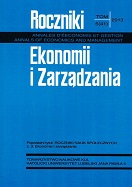Zmiany podstawowych uwarunkowań i zadań spółdzielni rolniczych w Polsce
Changes of Basic Conditionings and Tasks of Agricultural Cooperatives In Poland
Author(s): Maria Zuba, Jan ZubaSubject(s): Economy
Published by: Towarzystwo Naukowe KUL & Katolicki Uniwersytet Lubelski Jana Pawła II
Keywords: agricultural cooperative; conditionings; tasks; spółdzielnia rolnicza; uwarunkowania; zadania
Summary/Abstract: Through its social dimension and its economic efficiency, the cooperative form of business is a particularly important link in the process of the development of the rural areas in Poland. Cooperatives use their technical and social infrastructure for the propagation of the economic, organizational, technical and social advancement. Similarly to the interwar period, the agricultural cooperative movement may contribute substantially to the development of the Polish rural areas. As cooperatives have to compete on contemporary market, their functioning had to change to match the requirements of a regular business process, with a suitably organized process of production and effective marketing. Conditions in which cooperatives work nowadays changed. That is why the functioning of cooperatives cannot be based mainly on ideological grounds, but it should be defined in terms of highly effective business operation. First of all, legal and economic conditions give grounds to the model of the entrepreneurial cooperative, based on economic and commercial practices. This article contains a presentation of the changes of basic conditionings and tasks of collective farms in Poland, with reference to the historical development of this form of cooperative movement.
Journal: Roczniki Ekonomii i Zarządzania
- Issue Year: 2013
- Issue No: 41
- Page Range: 89-110
- Page Count: 22
- Language: Polish

